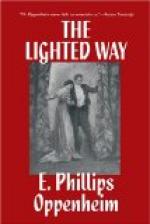“For the murder of Mr. Rosario?” Arnold asked.
“Precisely,” Sabatini replied. “A very unfortunate circumstance. Let us hope that he will be able to prove his innocence.”
“I don’t see how he could have done it,” Arnold said slowly. “We saw him only about ten minutes or a quarter of an hour later coming up from the restaurant on the other side of the hotel.”
“Oh! he will come very near proving an alibi, without a doubt,” Sabatini declared. “He is quite clever when it comes to the point. I wonder what sort of evidence they have against him.”
“Is there any reason,” Arnold asked, “why he should kill Mr. Rosario?”
Sabatini studied his program earnestly.
“Well,” he admitted, “that is rather a difficult question to answer. Mr. Rosario was a very obstinate man, and he was certainly persisting in a course of action against which I and many others had warned him, a course of action which was certain to make him exceedingly unpopular with a good many of us. I am not sure, however, whether the facts were sufficiently well known—”
Fenella interrupted. She rose hurriedly to her feet.
“I am afraid, after all, that you will have to excuse me,” she declared, moving to a seat at the back of the box. “I do not think that I can stay here.”
Sabatini nodded gravely.
“Perhaps you are right,” he said. “For my own part, I, too, wish I had more faith in Starling. As a matter of fact, I have none. When they caught Crampton, one could sleep in one’s bed; one knew. But this man Starling is a nervous wreck. Who knows what story he may tell—consciously or unconsciously—in his desperate attempts to clear himself? You see,” he continued, looking at Arnold, “there are a great many of us to whom Mr. Rosario was personally, just at this moment, obnoxious.”
Fenella swayed in her chair.
“I am going home,” she murmured.
“As you will,” Sabatini agreed. “Perhaps Mr. Chetwode will be so kind as to take you back? I have asked a friend to call here this evening.”
She turned to Arnold.
“Do!” she pleaded. “I am fit for nothing else. You will come with me?”
Arnold was already standing with his coat upon his arm.
“Of course,” he replied.
Her brother helped her on with her cloak.
“For myself,” he declared, “I shall remain. I should not like to miss my friend, if he comes, and they tell me that the second ballet is excellent.”
[Illustration: “For myself,” he declared, “I remain.” Page 139.]
She took his hands.
“You have courage, dear one,” she murmured.
He smiled.
“It is not courage,” he replied, “it is philosophy. If to-morrow were to be the end, would you not enjoy to-day? The true reasonableness of life is to live as though every day might be one’s last. We shall meet again very soon, Mr. Chetwode.”




